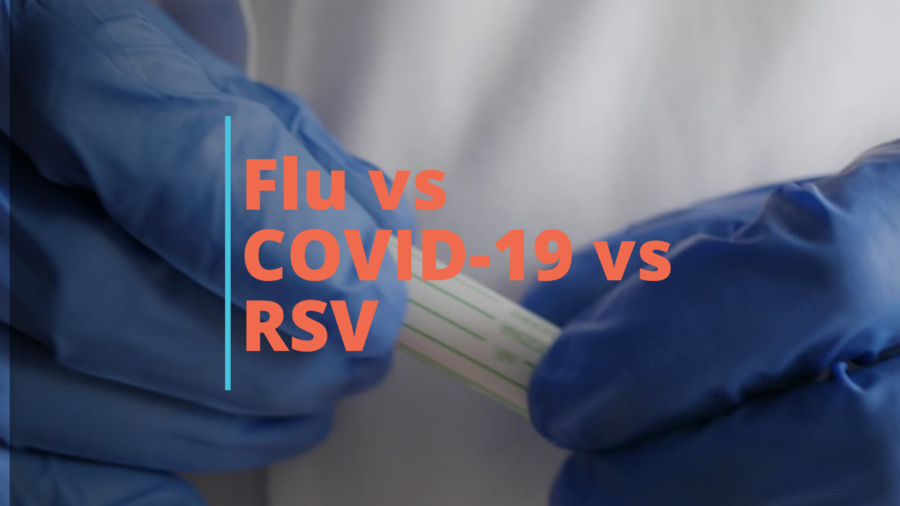Winter brings us into the heart of cold and flu season. Respiratory infections are most common this time of year. A respiratory infection is an infection of any part of the respiratory tract, including the lungs, airways, sinuses, and throat. Respiratory infections can occur year-round but are most common during cold and flu season in the fall and winter, presumably because people spend more time indoors in closer quarters. It is important to recognize the symptoms of respiratory infections and how to avoid spreading them.
Among the most common of these respiratory viruses are flu, Covid-19, and RSV. With symptoms similar between all 3, it can be difficult to determine which one you have. All three can be spread from person to person through droplets in the air when an infected person coughs, sneezes, or talks in close proximity to someone else. It is also possible to have more than one of these viruses at the same time.
Flu
Flu is caused by the influenza virus and is easily spread during the winter months. There are many different strains of flu and they can change from year to year. Symptoms of flu are almost identical to those of Covid-19 and include:
- Fever
- Chills
- Headache
- Muscle aches
- Fatigue
- Cough
- Runny nose
- Sore throat
- Shortness of breath
- Vomiting
- Diarrhea
Flu symptoms typically have a rapid onset versus Covid-19 and RSV symptoms. Flu can also result in pneumonia.
Covid-19
Covid-19 is caused by the SARS-CoV-2 virus which is a new coronavirus. Coronavirus is a family of viruses named for their corona-like shape. Covid-19 symptoms are almost identical to flu symptoms and include:
- Fever
- Chills
- Muscle aches
- Headache
- Fatigue
- Runny nose
- Sore throat
- Shortness of breath
- Cough
- Vomiting
- Diarrhea
- Loss of smell or taste
Loss of smell and taste are unique symptoms to Covid-19. It can take longer for symptoms of this virus to show up and people remain infectious longer than those with flu. Covid-19 can also result in pneumonia.
RSV
RSV is caused by the respiratory syncytial virus. It is a highly contagious virus that can infect both children and adults. In adults and older children the virus causes a mild illness that is similar to the common cold. Infants and the elderly with RSV have much more severe symptoms that start out slowly and then suddenly escalate. These cases can sometimes require hospitalization. RSV typically runs its course in 1 to 2 weeks. Symptoms of RSV include:
- Stuffy nose
- Runny nose
- Sore throat
- Sneezing
- Coughing
- Loss of appetite
- Fever
- Wheezing
Fever and wheezing is more common in those with severe cases (e.g., infants and the elderly).
Treatment for viruses differs from treatment for bacterial infections. Antibiotics will not work to treat any of these respiratory viruses. Your body fights off viruses by producing antibodies and treatment can be provided in the form of antiviral medications if necessary. Treatment is usually provided symptomatically with fever reducers, cough suppressants, steroids, nebulizers, decongestants, antihistamines, hydration, antiemetics, and antidiarrheals.
Practicing proper hygiene is the best way to prevent respiratory viruses year-round. Wash hands frequently with soap and water for at least 20 seconds. Cover your nose and mouth with the crook of your elbow when sneezing and coughing. Avoid contact with anyone who has symptoms of a respiratory infection. Don’t let anyone smoke around infants and young children.
With symptoms being so similar, the best way to determine which respiratory virus you have is through testing. Nasal swabs are available for flu, Covid-19, and RSV. Contact your healthcare provider for more information on testing for each of these viruses.
*Information presented in this blog is for educational purposes only and does not represent the clinical practices nor availability of testing of Genesis Reference Labs.
REFERENCES
https://www.cdc.gov/flu/symptoms/flu-vs-covid19.htm
https://www.cdc.gov/rsv/about/symptoms.html
https://hive.rochesterregional.org/2020/03/coronavirus-or-flu
https://riseandshine.childrensnational.org/covid-19-vs-rsv-vs-flu

